A metallic square loop ABCD is moving in its own plane with velocity v in a uniform magnetic field perpendicular to its plane as shown in the figure. An electric field is induced
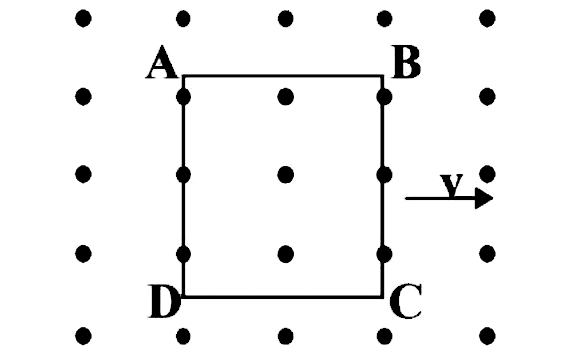
in AD, but not in BC
in BC, but not in AD
neither in AD nor in BC
in both AD and BC
The correct Answer is:D
Electric field will be induced, as ABCD moves, in both AD and BC. The metallic square loop moves in its own plane with velocity v. A uniform magnetic field is imposed perpendicular to the plane of the square loop. AD and BC are perpendicular to the velocity as well as perpendicular to applied.
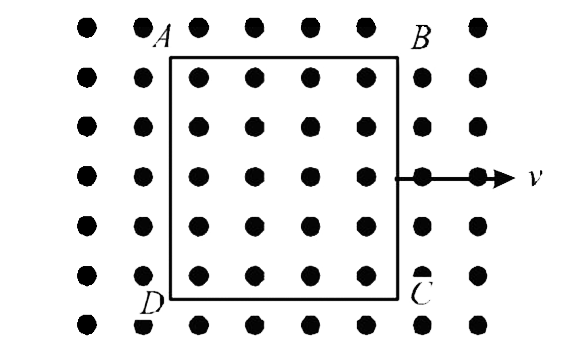 .
.
Topper's Solved these Questions
Similar Questions
A metallic square loop ABCD is moving in its own plane with velocity v in a uniform magnetic field perpendicular to its plane as shown in the figure. Find
a) In which sides of the loop electric field is induced.
b) Net emf induced in the loop
c) If one 'BC' is outside the field with remaining loop in the field and is being pulled ot a constant velocity then induced current in the loop.
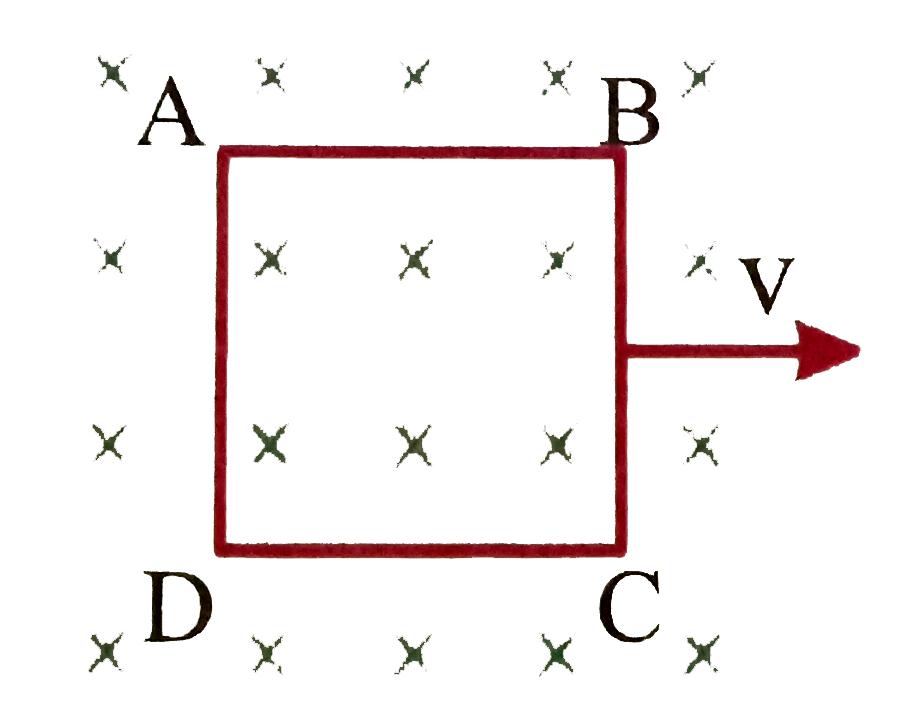
View SolutionA square loop of side d is moved with velocity vˆi in an non-uniform magnetic field B0axˆk then the emf induced shown is?
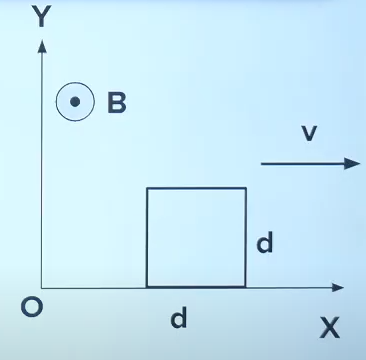
View Solution
Knowledge Check
A metalic square loop ABCD is moving in its own plane with velocity v is in a uniform magnetic field perpendicular to its plane as shown in the figure . An electric field is induced
 AIn AD , but not in BCBIn BC , but not in ADCNeither in AD nor in BCDIn both AD and BC
AIn AD , but not in BCBIn BC , but not in ADCNeither in AD nor in BCDIn both AD and BCA metallic square loop PQRS is moving in its own plane with velocity v in a uniform magnetic field perpendicular to its plane as shown in Fig. If VP,VQ,VRandVS are the potentials of points P, Q, R and S then which of the following is an incorrect statement?
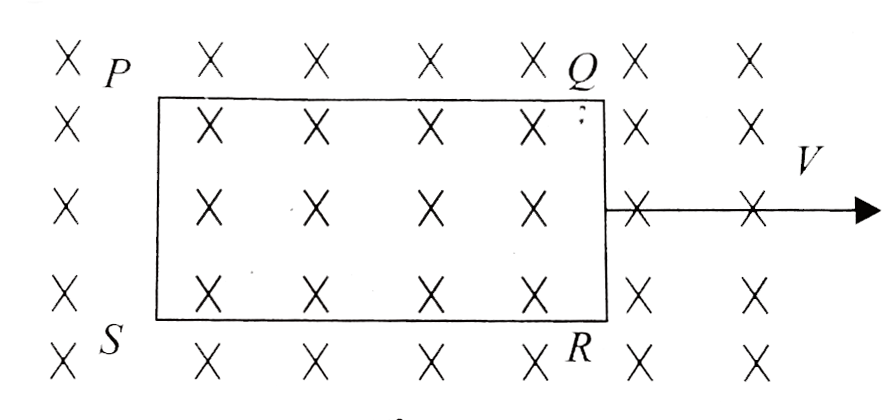 AVP=VQBVP>VSCVP>VRDVS=VR
AVP=VQBVP>VSCVP>VRDVS=VRA rod AB moves with a uniform velocity v in a uniform magnetic field as shown in figure.
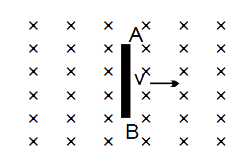 AThe rod becomes electrically chargedBThe end A becomes positively chargedCThe end B becomes positively chargedDThe rod becomes hot because of Joule heating
AThe rod becomes electrically chargedBThe end A becomes positively chargedCThe end B becomes positively chargedDThe rod becomes hot because of Joule heating
A square metal wire loop of side 10 cm and resistance 1 ohm is moved with a constant velocity (v0) in a uniform magnetic field of induction B=2weber/m2 as shown in the figure. The magnetic field lines are perpendicular to the plane to the loop (directed into the paper). The loop is connected to a network of resistors each of value 3 ohms. The resistances of hte lead wire OS and PQ are negligible. What should be the speed of the loop so as to have a steady current of 1 milliampere in the loop? Given the direction of current in the loop.
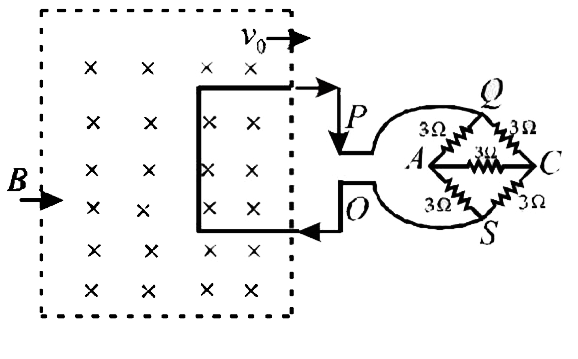
View SolutionA copper wire bent in the shape of a semicircle of radius r translates in its plane with a constant velocity v. A uniform magnetic field B exists in the direction perpendicular to the plane of the wire. Find the emf induced between the ends of the wire if (a) the velocity is perpendicular ot the diameter joining free ends, (b) the velocity is parallel to this diameter.
View SolutionA square metal wire loop of side 20 cm and resistance 2Ω is moved with a constant velcoity v0 in a uniform magnetic field of induction B = 1 Wb/m2 as shown in the figure. The magnetic field lines are perpendicular to the plane of the loop. The loop is connected to a network of resistance each of value 5Ω. The resistances of the lead wires BF and AE are negligible. What should be the speed of the loop, so as to have a steady current of 2 mA in the loop? Give the direction of current in the loop.
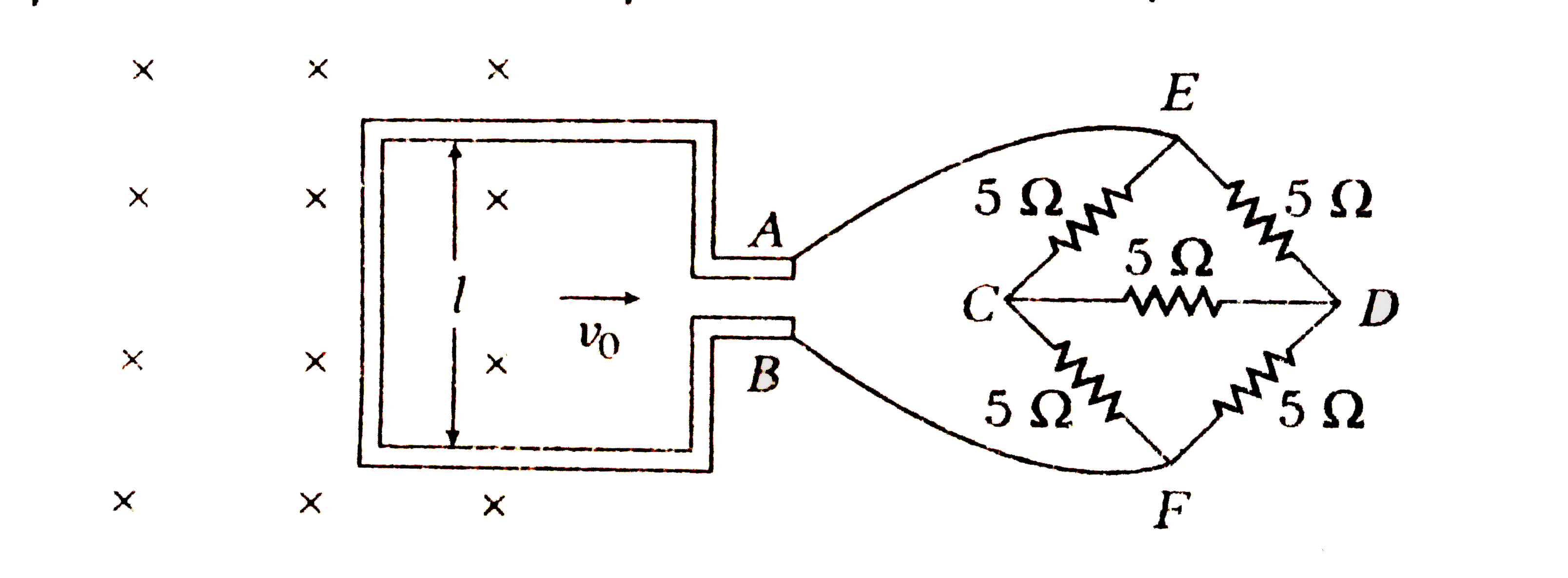
View SolutionA square conducting loop of side L and resistance R is moving with a uniform velocity at right angles to one of the side in its own plane . On applying a uniform magnetic field at right angles to its plane as show in the figure the induced current in the loop will be __
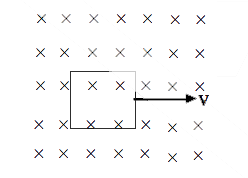
View SolutionA conducting ring is placed in a uniform magnetic field with its plane perpendicular to the field . An emf is induced in the ring if
View Solution